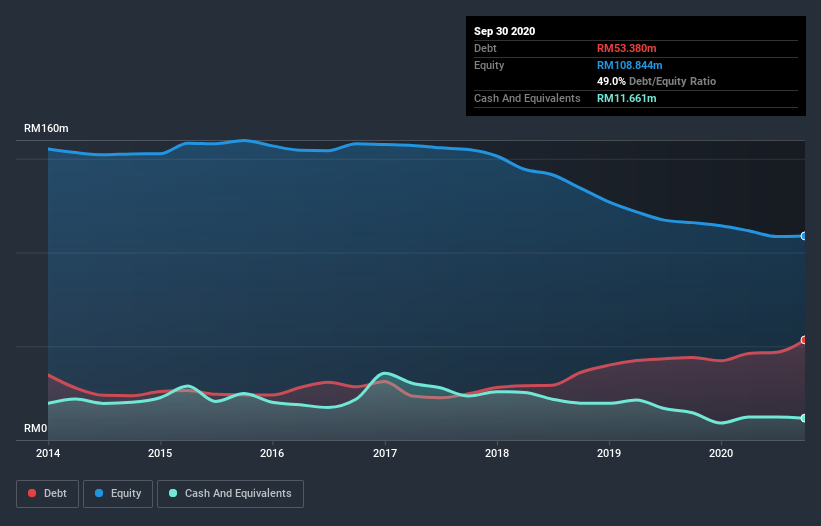YLI Holdings Berhad (KLSE:YLI) Is Making Moderate Use Of Debt

Warren Buffett famously said, 'Volatility is far from synonymous with risk.' So it might be obvious that you need to consider debt, when you think about how risky any given stock is, because too much debt can sink a company. As with many other companies YLI Holdings Berhad (KLSE:YLI) makes use of debt. But the real question is whether this debt is making the company risky.
When Is Debt Dangerous?
Debt and other liabilities become risky for a business when it cannot easily fulfill those obligations, either with free cash flow or by raising capital at an attractive price. In the worst case scenario, a company can go bankrupt if it cannot pay its creditors. While that is not too common, we often do see indebted companies permanently diluting shareholders because lenders force them to raise capital at a distressed price. Having said that, the most common situation is where a company manages its debt reasonably well - and to its own advantage. The first thing to do when considering how much debt a business uses is to look at its cash and debt together.
Check out our latest analysis for YLI Holdings Berhad
What Is YLI Holdings Berhad's Net Debt?
You can click the graphic below for the historical numbers, but it shows that as of September 2020 YLI Holdings Berhad had RM53.4m of debt, an increase on RM44.0m, over one year. However, it also had RM11.7m in cash, and so its net debt is RM41.7m.

How Healthy Is YLI Holdings Berhad's Balance Sheet?
Zooming in on the latest balance sheet data, we can see that YLI Holdings Berhad had liabilities of RM96.9m due within 12 months and liabilities of RM1.24m due beyond that. Offsetting these obligations, it had cash of RM11.7m as well as receivables valued at RM57.2m due within 12 months. So its liabilities total RM29.3m more than the combination of its cash and short-term receivables.
This is a mountain of leverage relative to its market capitalization of RM44.7m. Should its lenders demand that it shore up the balance sheet, shareholders would likely face severe dilution. The balance sheet is clearly the area to focus on when you are analysing debt. But it is YLI Holdings Berhad's earnings that will influence how the balance sheet holds up in the future. So when considering debt, it's definitely worth looking at the earnings trend. Click here for an interactive snapshot.
Over 12 months, YLI Holdings Berhad made a loss at the EBIT level, and saw its revenue drop to RM89m, which is a fall of 11%. That's not what we would hope to see.
Caveat Emptor
While YLI Holdings Berhad's falling revenue is about as heartwarming as a wet blanket, arguably its earnings before interest and tax (EBIT) loss is even less appealing. To be specific the EBIT loss came in at RM4.3m. Considering that alongside the liabilities mentioned above does not give us much confidence that company should be using so much debt. So we think its balance sheet is a little strained, though not beyond repair. Another cause for caution is that is bled RM12m in negative free cash flow over the last twelve months. So in short it's a really risky stock. There's no doubt that we learn most about debt from the balance sheet. But ultimately, every company can contain risks that exist outside of the balance sheet. Like risks, for instance. Every company has them, and we've spotted 4 warning signs for YLI Holdings Berhad (of which 2 make us uncomfortable!) you should know about.
If you're interested in investing in businesses that can grow profits without the burden of debt, then check out this free list of growing businesses that have net cash on the balance sheet.
If you’re looking to trade YLI Holdings Berhad, open an account with the lowest-cost* platform trusted by professionals, Interactive Brokers. Their clients from over 200 countries and territories trade stocks, options, futures, forex, bonds and funds worldwide from a single integrated account. Promoted
New: Manage All Your Stock Portfolios in One Place
We've created the ultimate portfolio companion for stock investors, and it's free.
• Connect an unlimited number of Portfolios and see your total in one currency
• Be alerted to new Warning Signs or Risks via email or mobile
• Track the Fair Value of your stocks
This article by Simply Wall St is general in nature. It does not constitute a recommendation to buy or sell any stock, and does not take account of your objectives, or your financial situation. We aim to bring you long-term focused analysis driven by fundamental data. Note that our analysis may not factor in the latest price-sensitive company announcements or qualitative material. Simply Wall St has no position in any stocks mentioned.
*Interactive Brokers Rated Lowest Cost Broker by StockBrokers.com Annual Online Review 2020
Have feedback on this article? Concerned about the content? Get in touch with us directly. Alternatively, email editorial-team (at) simplywallst.com.
About KLSE:YLI
YLI Holdings Berhad
An investment holding company, manufactures and trades in ductile iron pipes, steel and plastic pipes and fittings, and waterworks related products for the sewerage and waterworks industries in Malaysia, Singapore, and Vietnam.
Adequate balance sheet and slightly overvalued.
Market Insights
Community Narratives




